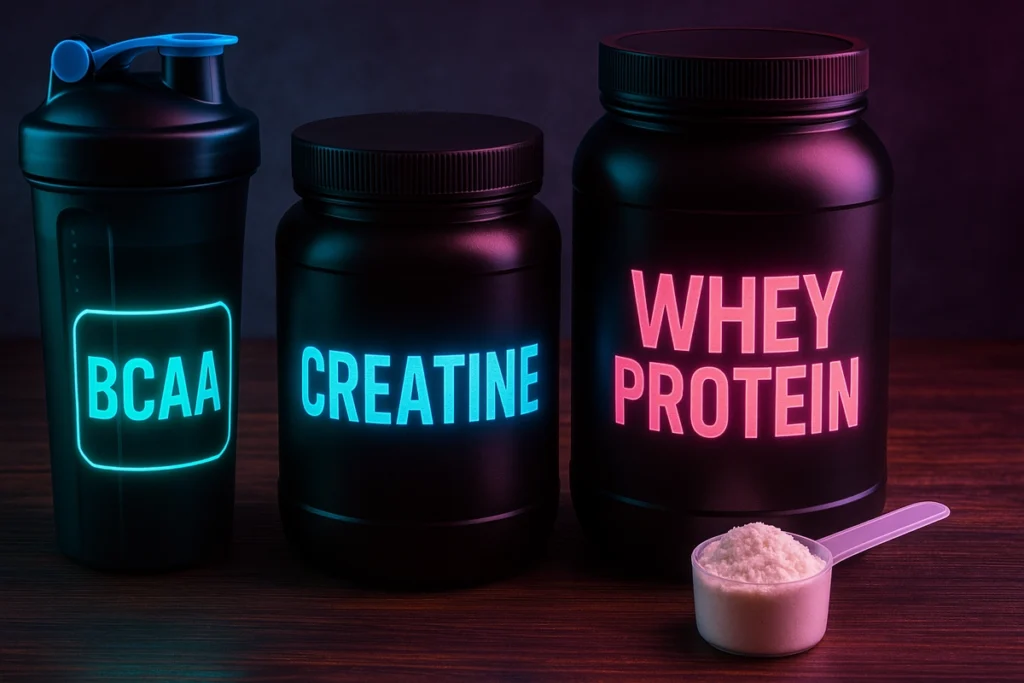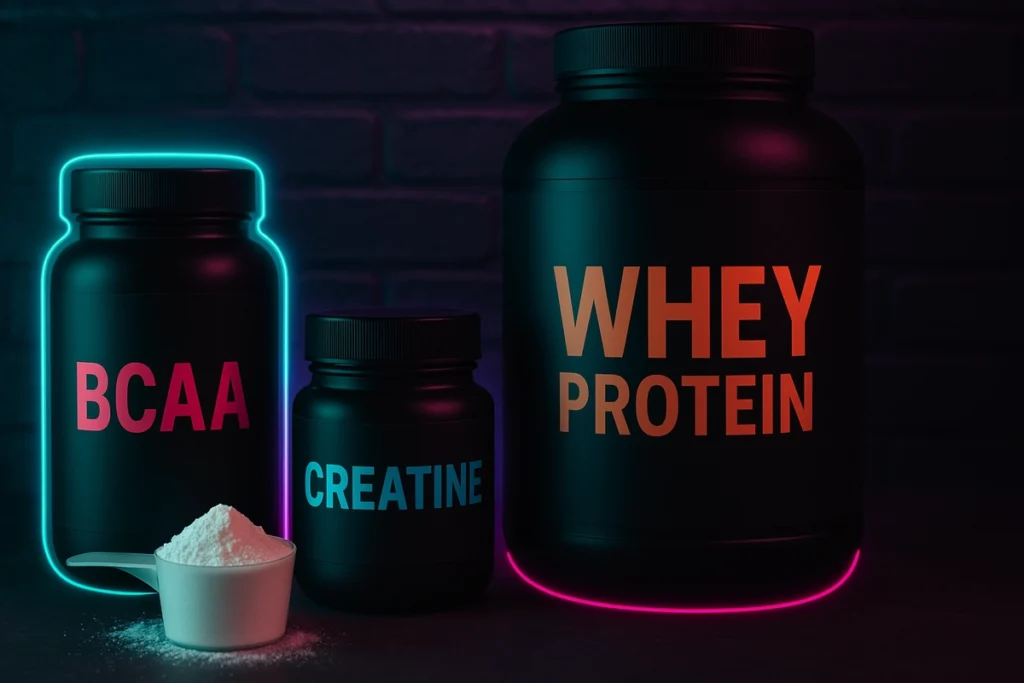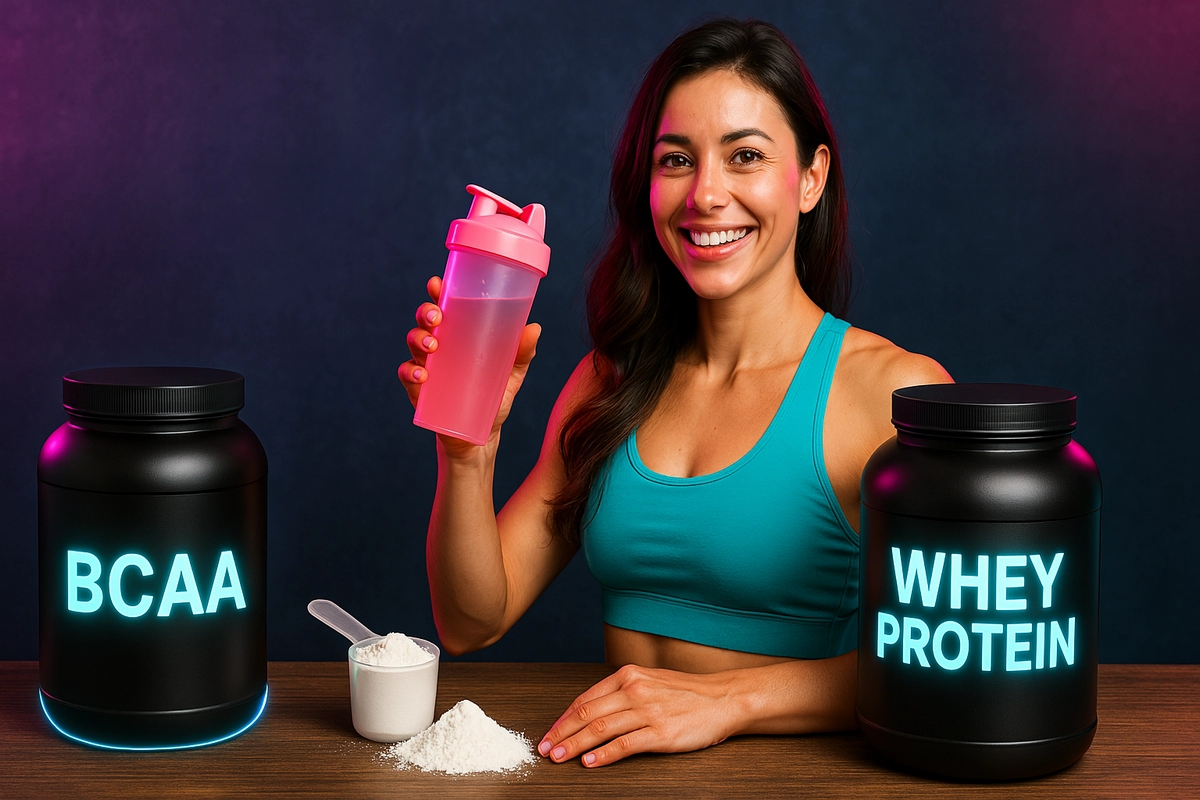If you’re serious about muscle building and boosting your performance, you might be wondering: Can you take BCAA, creatine, and whey protein together? The short answer is: Yes, it’s not only safe, but it can also be a game-changer when used correctly.
As a fitness trainer, I’ve seen firsthand how these three supplements work together to help my clients crush their fitness goals.
Table of contents
- What Are BCAA, Creatine, and Whey Protein?
- The Benefits of Combining BCAA, Creatine, and Whey Protein
- Is It Safe to Take BCAA, Creatine, and Whey Protein Together?
- When and How to Take Them for Maximum Effectiveness
- Real-Life Example: Client Success Story
- Final Thoughts: Should You Take BCAA, Creatine, and Whey Protein Together?
- Conclusion
What Are BCAA, Creatine, and Whey Protein?

Before we talk about how to use them together, let’s quickly define what these supplements actually do.
- BCAA (Branched-Chain Amino Acids): These are essential amino acids that help with muscle recovery and reduce muscle soreness after tough workouts. They also help prevent muscle breakdown during intense training.
- Creatine: This naturally occurring compound helps increase energy production in muscles, which allows you to push harder during your workouts. More power = better performance and faster muscle growth.
- Whey Protein: A fast-digesting protein source that helps with muscle repair and growth after exercise. It’s packed with essential amino acids that your body needs to build muscle tissue.
The Benefits of Combining BCAA, Creatine, and Whey Protein
I’ve personally used this combination for years, and I can tell you from experience—it works. For instance, I remember the first time I used these three together. My weight was 75 kg, and within just two months of incorporating BCAA, creatine, and whey protein into my routine, I gained 11 kg of lean muscle (total weight: 86 kg!). That’s right—11 kg of solid muscle with no extra fat.
Here’s why it’s effective:
- BCAAs promote muscle repair and reduce soreness, which means you recover faster and can train harder.
- Creatine boosts strength and performance. It helps you push through those last few reps that are critical for muscle growth.
- Whey Protein feeds your muscles with the right nutrients for growth and recovery after those intense workouts.
Is It Safe to Take BCAA, Creatine, and Whey Protein Together?

As long as you use them responsibly, there’s no reason not to take these supplements together. In fact, it’s something I recommend all the time to my clients—especially those looking to build muscle and boost performance.
That said, you should always:
- Use high-quality supplements—low-quality or fake products can cause more harm than good.
- Ensure your body is healthy before starting supplementation. If you have any existing kidney or liver issues, it’s important to consult with a doctor before using creatine, as it can affect these organs.
- Stick to the recommended dosages. Overuse of creatine, for instance, can cause dehydration and digestive issues.
I’ve personally never experienced side effects using this stack, but I have worked with clients who’ve had minor issues, like dehydration when they didn’t drink enough water while using creatine. It’s key to stay hydrated, especially when you’re supplementing with creatine.
When and How to Take Them for Maximum Effectiveness

Timing and dosage are crucial to getting the most out of your supplements. Here’s a simple guide:
- Whey Protein: Take it immediately after your workout. This is when your muscles are most receptive to nutrients and need protein for repair.
- Creatine: You can take it pre- or post-workout—whichever you prefer. I personally like taking it pre-workout because I feel the extra boost of energy, but you can also take it post-workout to replenish your muscles.
- BCAAs: I recommend sipping on BCAAs during your workout to help with muscle endurance and recovery.
As a general rule of thumb, make sure you’re using the recommended dosages: 5 grams of creatine, 10-15 grams of BCAAs, and 20-30 grams of whey protein post-workout. Adjust based on your body size and goals.
If you want to take BCAA, Creatine, and Whey Protein together at the same time, the best time to do so is post-workout. This is when your body needs recovery the most, and these three supplements can effectively support muscle repair and growth.
Overall, taking these three supplements around 30 minutes to 1 hour after your workout is when they’ll have the greatest impact, as your muscles are in the most need of nutrients for recovery. To make it easier, you can mix all three supplements into a single protein shake and drink it post-workout.
If you don’t want to take whey protein but want to use BCAA and creatine together, check out the article on the best time to take BCAA and creatine on MuscleZeus.
Are you wondering whether to take creatine in the morning on an empty stomach? This guide can help. Check out the article on taking creatine on an empty stomach in the morning for more insights.
Real-Life Example: Client Success Story
I’ve worked with clients who saw incredible results using this combination. One client, in particular, came to me for help with passing a physical fitness test for a job application. He was struggling with strength and endurance but after 4 months of following a proper training regimen combined with BCAA, creatine, and whey protein, he passed the test with flying colors!
His strength, power, and overall performance skyrocketed, and the best part? He wasn’t just stronger; he was more confident too. That’s the power of proper supplementation.
Possible Side Effects of BCAA, Creatine, and Whey Protein

While BCAA, creatine, and whey protein can be highly effective in supporting muscle recovery, performance, and growth, it’s important to understand that, like any supplement, they can have potential side effects. Here’s a breakdown of what you might need to watch out for when taking these supplements:
1. BCAA (Branched-Chain Amino Acids)
BCAAs are generally considered safe for most individuals when used as recommended. However, some potential side effects include:
- Gastrointestinal Issues: Some people may experience bloating, diarrhea, or an upset stomach when taking BCAAs, especially if consumed in high doses.
- Imbalance in Amino Acids: Overconsumption of BCAAs at the expense of other amino acids might disrupt the natural balance of amino acids in the body, leading to potential issues like fatigue or impaired muscle protein synthesis.
- Interference with Blood Sugar Levels: There’s a possibility that BCAAs might affect blood sugar levels. Individuals with diabetes or blood sugar issues should consult a doctor before using them.
2. Creatine
Creatine is one of the most researched and widely used supplements, and it’s generally safe when taken in recommended doses. However, there are a few potential side effects:
- Water Retention: One of the most common side effects of creatine is water retention. This can cause a temporary increase in weight due to extra water being stored in the muscles.
- Kidney Stress: While creatine is safe for most people, excessive doses or long-term use of very high doses (20g per day or more) might put stress on the kidneys, especially for individuals with pre-existing kidney issues. It’s crucial to stick to recommended doses (3-5g per day) and ensure proper hydration.
- Digestive Issues: Some users may experience bloating, cramps, or diarrhea, particularly when taking creatine in large doses or without enough water.
3. Whey Protein
Whey protein is a highly effective supplement, but it can cause side effects in some individuals, especially those with sensitivities or allergies:
- Lactose Intolerance: Since whey protein is derived from milk, people who are lactose intolerant may experience bloating, gas, diarrhea, or stomach cramps. Choosing whey protein isolate (which has lower lactose levels) may help reduce these symptoms.
- Kidney Strain: High protein intake over time can put strain on the kidneys, especially for those with existing kidney issues. However, for healthy individuals, moderate whey protein intake is unlikely to cause harm.
- Allergic Reactions: Some individuals may be allergic to whey protein, which can lead to symptoms such as hives, swelling, or difficulty breathing. If you suspect an allergy, consult a doctor before using whey protein.
General Tips for Minimizing Side Effects

- Stay Hydrated: Particularly when using creatine, make sure to drink plenty of water throughout the day to prevent dehydration and support kidney function.
- Stick to Recommended Doses: Follow the recommended dosages for each supplement. Overuse of any supplement can lead to unnecessary side effects and potential long-term health issues.
- Consult a Doctor: If you have any underlying medical conditions (like kidney or liver issues, or diabetes), it’s best to consult with a healthcare professional before starting any new supplement regimen.
- Gradual Introduction: If you’re new to supplements, consider introducing them gradually into your routine to see how your body reacts. This can help prevent digestive issues and other unwanted effects.
By understanding these potential side effects and using these supplements responsibly, you can enjoy the benefits without risking your health.
Final Thoughts: Should You Take BCAA, Creatine, and Whey Protein Together?

Absolutely! If you’re looking to build muscle, increase strength, and speed up recovery, this combination can help you achieve your goals faster. But remember, supplements should always complement a healthy diet and proper training routine.
Also, if you’re in a cutting phase (trying to lose fat while maintaining muscle), this stack is still beneficial because it helps prevent muscle breakdown while you’re in a calorie deficit. But make sure your diet and exercise are the main focus. Supplements are there to support—not replace—your efforts.
Conclusion
To sum it up, BCAA, creatine, and whey protein can work wonders together. From my experience as a trainer, I’ve seen these supplements take clients from good to great, helping them unlock their full potential. With the right dosage, timing, and quality products, you’ll see noticeable improvements in your strength, muscle mass, and overall fitness.
So, what are you waiting for? Try adding these supplements into your routine and see how they work for you. Trust me, you won’t regret it!
🩺 Disclaimer: This article is for informational purposes only and not medical advice. Always consult with a healthcare provider before starting any supplement.



Leave a Reply